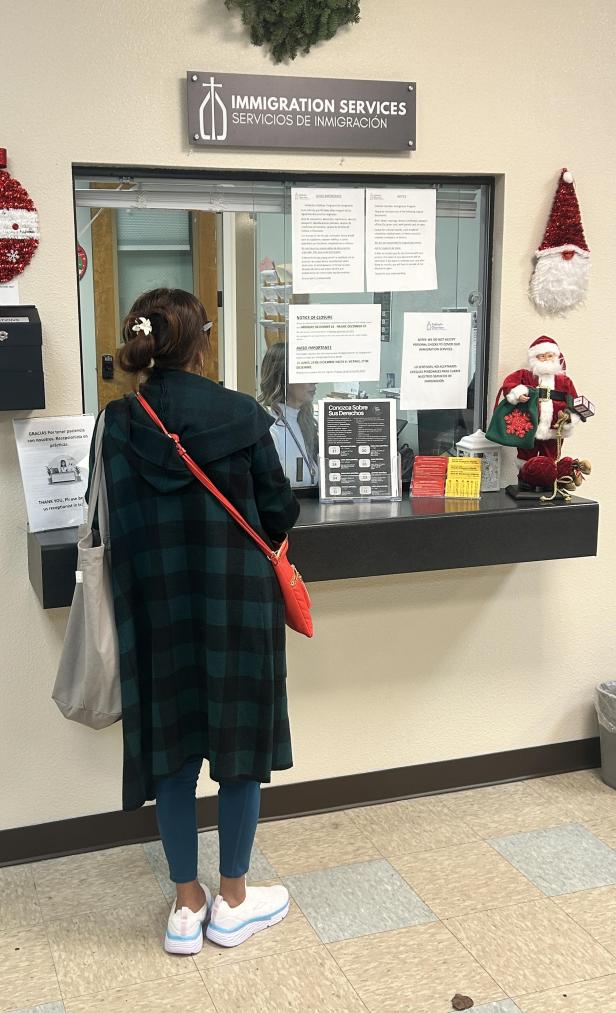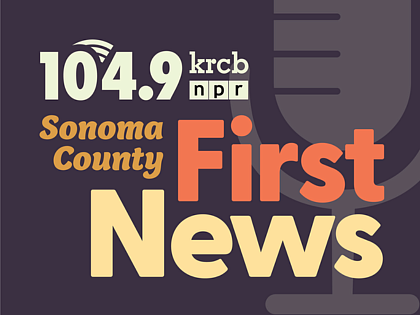 photo credit: Lauren Spates
photo credit: Lauren SpatesCatholic Charities' immigration services window in Santa Rosa.
Dina Lopez says she didn’t sleep on election night, and by the time she arrived at her desk the next morning at Catholic Charities of the Diocese of Santa Rosa, the director of immigration services and her team had already organized a series of educational presentations called 'Know About Your Rights.'
The organization’s presentations teach attendees that knowing how to exercise their rights may help them avoid arrest and limit the actions of federal immigration officials in their communities.
Attendees also learn what they have the right to do — or not do — based on where an officer stops them, whether at home, in their car or on the street.
All the scenarios are necessary, Lopez said, because no one really knows what will happen after Jan. 20.
“The only thing that we are certain of, and according to our experience, is that we are going to face difficult times, but we don't know exactly what's going to happen,” Lopez said. “Our goal right now, is just to inform people what they can do, what their rights are, and unfortunately, but it's something that we need to do, is emergency preparedness.”
Lopez has been in the U.S. for 20 years and doing immigration work for over a decade. At Catholic Charities, she leads a group of specialists who help file paperwork and petitions for immigrants including DACA recipients and asylum-seekers. They assist with filing for work permits, legal permanent residency and citizenship.
According to CEO Jennielyn Holmes, hundreds of people have attended the six 'Know About Your Rights' sessions they’ve held in the past three-plus weeks. She said that isn’t surprising to her given the scale of Catholic Charities’ local operation.
According to Holmes, the Santa Rosa nonprofit is the largest provider of DACA services in Northern California, and the largest immigration legal services operation in the county.
She said staff across the organization were on edge Nov. 5.
“The next morning, you know, we gathered and wanted to kind of hold space, because a lot of the people we work with, we knew we're going to be feeling a lot of different emotions based on the outcome of the election,” Holmes said. “And by the end of the meeting, the team was ready to go back into the world and start to re-empower and educate the people we serve.”
Attendees at the 'Know About Your Rights' sessions learn specifics for what to do if they’re stopped or detained.
These details include how they are never obligated to speak to an officer, but if they do, Catholic Charities Immigration Services advises they use phrases such as, “Why am I being detained?” “Am I free to go?” “I wish to remain silent” or “I wish to speak to a lawyer.”
Attendees receive what’s called a Red Card — a cherry-red business card with five bullet points that link the holder’s personal rights back to the 4th and 5th Amendments’ protections from unreasonable searches and from self-incrimination. One side is printed in English; the other, in Spanish.
The sessions also provide attendees a chance to talk to the organization’s legal specialists who look downstream of a stop or detainment to see how family members, particularly minors, might be affected.
“One of the things we're really focused on right now is power of attorney. So if a parent is to be detained, making sure that someone else can keep the children here,” Holmes said. “So that's something we're working with individuals on right now, is making sure that they have a safety plan. They've given power of attorney to someone who might have a more protected status. Those are the things we're walking through.”
This level of detail includes writing down whether the children take medications. Lopez stressed all the guidance they provide is legal.
“We provide our services according to the law. Unfortunately, there are some thoughts that we are providing services that are illegal, which is not true. We must follow what the law says. In fact, when we are providing these presentations, it is according to the law. What we say is 'Know your rights in the U.S., the rights that everyone has in the U.S., regardless of your immigration status,’" Lopez said.
Holmes agreed.
“A lot of people have a lot of misconceptions around what Catholic Charities does, but we only work with the government and through their system, so we're helping people legally through what services are or aren't available, but that's where we have an insider view of how broken the system is and how it needs a real revamp around serving people who do deserve opportunity and do make up the fabric of our economy,” she said.
Holmes said she doesn’t see that “real revamp” on the docket in the next four years, so in the meantime, she, Lopez and their staff will follow their calling to educate.
“You walk into our front lobby, you see the faces of these kids. You see the faces of these individuals who, in the past, felt hopeful they were coming in for their next step, and now they're feeling crisis and desperation because they don't know what their future holds,” she said. “And when you look into the eyes of these people, you do not see an issue. You see a person, and we've lost that to some degree, and we want to advocate that that needs to be brought back.”
The next two Know About Your Rights sessions are scheduled for Dec 11 from 6-7 p.m., with a Spanish session at La Luz Center in Sonoma and an English session at Catholic Charities headquarters in Santa Rosa.
Dates for the rest of December and January are forthcoming, but Holmes noted the in-person classes will cease before Inauguration Day, after which a new video series will become available on the Catholic Charities of Santa Rosa website.
For more information on the Know About Your Rights sessions — or if you’re interested in hosting the presentation in your workplace — visit srcharities.org.

 Live Radio
Live Radio




